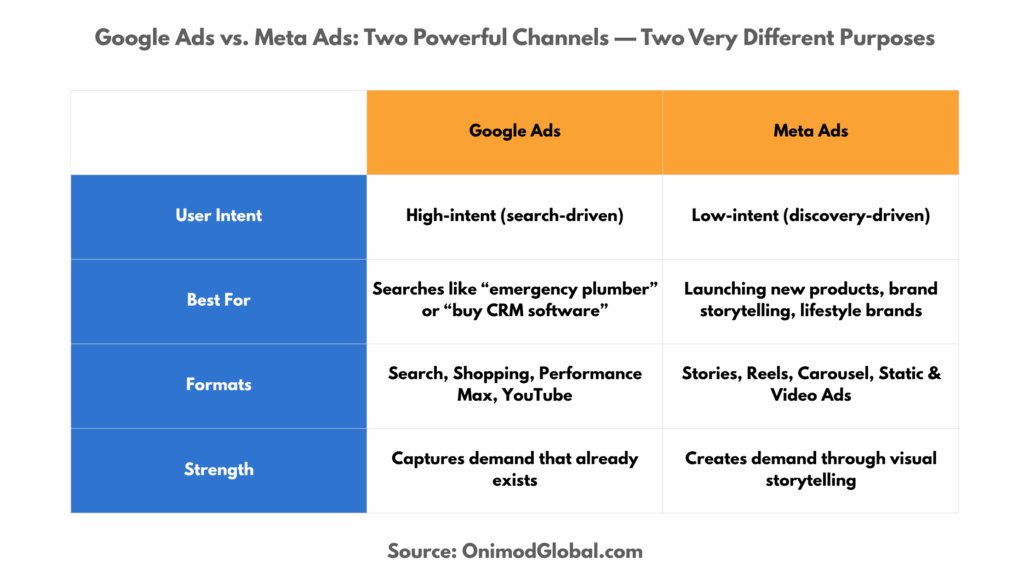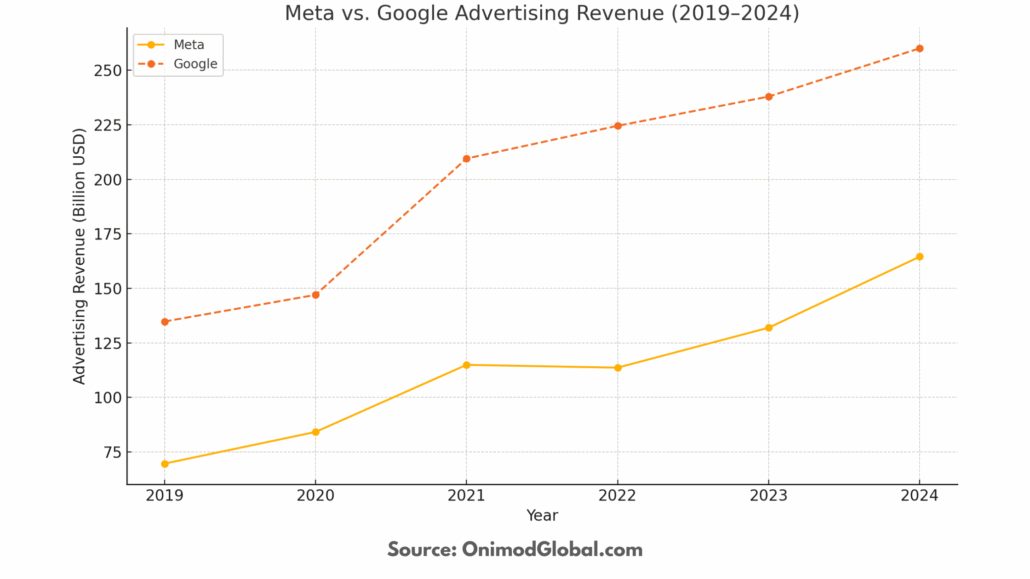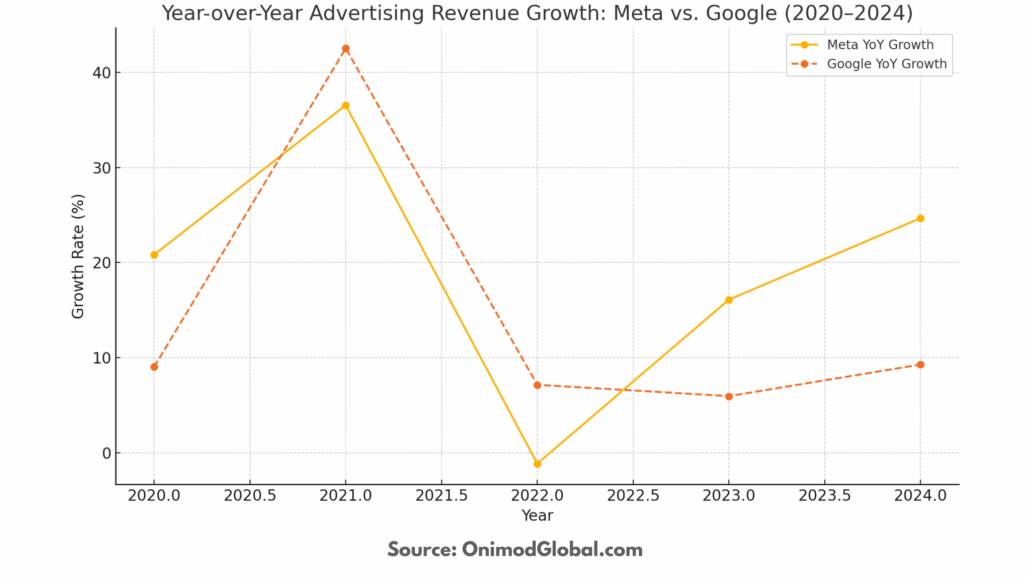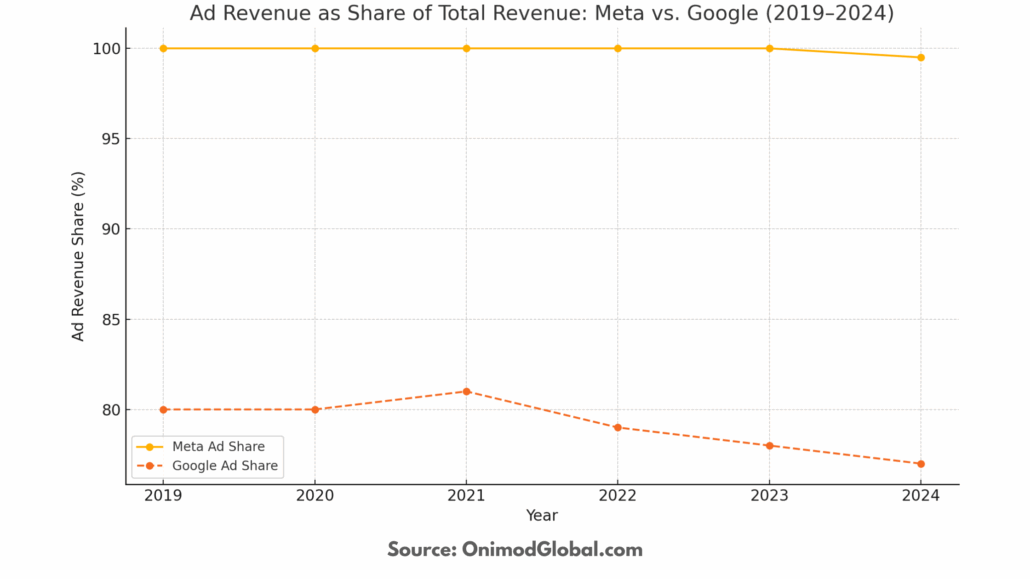Google Ads vs. Meta Ads: How to Choose the Right Platform for Your Business
If your paid ads are underperforming, the issue might not be your messaging. It might be the platform you are using. At Onimod Global, we have audited countless ad accounts and discovered a consistent mistake: choosing the wrong platform for the audience, product, or objective.
When comparing Google Ads and Meta Ads (Facebook and Instagram), there is no universal winner. The best choice depends on user intent, visibility goals, and strategic fit. Here’s what you need to know.
Google Ads vs. Meta Ads: Understanding the Differences
Google Ads target users based on active search intent. People visit Google when they are already looking for a solution.
-
Best for: High-intent searches like “emergency plumber” or “best accounting software”
-
Ad formats: Search Ads, Shopping, Performance Max, YouTube
-
Biggest strength: Capturing demand that already exists
Meta Ads are discovery-based. These ads show up while users are browsing or scrolling, not actively searching.
-
Best for: Product discovery, brand storytelling, new product launches
-
Ad formats: Image, Video, Carousel, Stories, Reels
-
Biggest strength: Creating demand by reaching users before they know they need something
Are Your Paid Ads Underperforming? The Real Problem Might Be Your Platform
If your paid ads aren’t delivering ROI, your messaging may not be the issue; it might be the platform itself. At Onimod Global, we’ve audited hundreds of ad accounts and discovered a common mistake: brands often choose the wrong platform for their audience, product, or goal.
Meta vs. Google: Who’s Winning in Ad Revenue?
| Year | Meta Ad Revenue | Google Ad Revenue (Est.) |
|---|---|---|
| 2019 | $69.66B | ~$134.8B |
| 2020 | $84.17B | ~$147.0B |
| 2021 | $114.93B | ~$209.5B |
| 2022 | $113.64B | ~$224.5B |
| 2023 | $131.95B | ~$237.9B |
| 2024 | $164.50B | ~$260.0B (projected) |
📌 Note: Google ad revenue includes Search, YouTube Ads, and Display Network.
While Google maintains the lead in ad revenue, Meta’s growth is accelerating. From 2022 to 2024, Meta’s ad revenue surged from $113.64B to $164.5B, a 45% leap. This signals Meta’s increasing dominance in visual-first, discovery-driven advertising; especially through Reels, AI targeting, and Instagram commerce.
Ad Revenue Growth Trends (2020–2024)
-
Meta’s growth peaked in 2021 and again in 2024, showing how innovation (e.g., AI targeting, video formats) is fueling results.
-
Google’s growth is steady but less volatile, offering predictable results for performance-driven campaigns.
Ad Dependence & Diversification
While Google leads in total revenue, Meta is catching up fast. From 2022 to 2024, Meta’s ad revenue grew 45%, signaling increasing dominance in visual, social-first advertising.
-
Meta is all-in on ads – 99% of its revenue comes from advertising.
-
Google is more diversified (Cloud, YouTube Premium, Devices), giving it more resilience – but slightly less focus.
Five Smart Rules for Choosing the Right Ad Platform
1. Match Platform to User Intent
-
Use Google Ads when your audience is actively searching for solutions.
-
Use Meta Ads when you want to introduce new ideas or products.
2. Think Like the Customer
-
Google users are goal-oriented. Be direct.
-
Meta users are browsing. Be inspirational or entertaining.
3. Let Search Volume Guide You
-
High search volume? Use Google.
-
Low search volume? Use Meta to spark awareness.
4. Don’t Split a Small Budget
-
Focus on one platform first, optimize it, and expand only when you see returns.
5. Reevaluate the Platform – Not Just the Creative
-
Many underperforming campaigns become successful just by changing ad platforms, not ad copy.
The Hidden Cost of Misalignment
Choosing the wrong platform leads to:
-
Low engagement
-
Wasted ad spend
-
Poor ROAS
We’ve seen clients 2x their performance by simply switching platforms without changing targeting or offer.
Final Thoughts
There is no universal “best” platform, only the one that aligns with your audience’s behavior and buying intent.
✅ At Onimod Global, we help you:
-
Pinpoint the right platform based on audience data
-
Build full-funnel campaigns that convert
-
Maximize your budget by aligning creative, platform, and timing
📩 Contact us today to stop guessing and start scaling.
FAQs
Q: Can I run Google and Meta Ads at the same time?
Yes, but focus your budget on one first to build traction and data.
Q: What if my audience is on both platforms?
We build cross-platform journeys that align messaging to behavior.
Q: Which is better for B2B?
Usually Google — but Meta shines for awareness and retargeting.
Q: Is Meta still worth it post-iOS updates?
Yes – with smart tracking, targeting, and creative, Meta can still drive big results.
Disclaimer: This blog post is for informational purposes only. Digital Marketing results may vary based on industry, budget, and ad strategy. Work with the certified Google Partners and Digital experts at Onimod Global for personalized campaign optimization.






